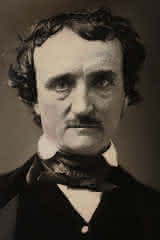A Elena, de Edgar Allan Poe | Poema
Poema en español
Te vi a punto.
Era una noche de julio,
noche tibia y perfumada,
noche diáfana…
De la luna plena límpida,
límpida como tu alma,
descendían
sobre el parque adormecido
gráciles velos de plata.
Ni una ráfaga
el infinito silencio
y la quietud perturbaban
en el parque…
Evaporaban las rosas
los perfumes de sus almas
para que los recogieras
en aquella noche mágica;
para que tú los gozases
su último aliento exhalaban
como en una muerte dulce,
como en una muerte lánguida,
y era una selva encantada,
y era una noche divina
llena de místicos sueños
y claridades fantásticas.
Toda de blanco vestida,
toda blanca,
sobre un ramo de violetas
reclinada
te veía
y a las rosas moribundas
y a ti, una luz tenue y diáfana
muy suavemente
alumbraba,
luz de perla diluida
en un éter de suspiros
y de evaporadas lágrimas.
¿Qué hado extraño
(¿fue ventura? ¿fue desgracia?)
me condujo aquella noche
hasta el parque de las rosas
que exhalaban
los suspiros perfumados
de sus almas?
Ni una hoja
susurraba;
no se oía
una pisada;
todo mudo,
todo en sueños,
menos tú y yo
-¡cuál me agito
al unir las dos palabras! —
menos tú y yo…De repente
todo cambia.
¡Oh, el parque de los misterios!
¡Oh, la región encantada!
Todo, todo,
todo cambia.
De la luna la luz límpida
la luz de perla se apaga.
El perfume de las rosas
muere en las dormidas auras.
Los senderos se oscurecen.
Expiran las violas castas.
Menos tú y yo, todo huye,
todo muere,
todo pasa…
Todo se apaga y extingue
menos tus hondas miradas.
¡Tus dos ojos donde arde tu alma!
Y sólo veo entre sombras
aquellos ojos brillantes,
¡oh mi amada! Todo, todo,
todo cambia.
De la luna la luz límpida
la luz de perla se apaga.
El perfume de las rosas
muere en las dormidas auras.
Los senderos se oscurecen.
Expiran las violas castas.
Menos tú y yo, todo huye,
todo muere,
todo pasa…
Todo se apaga y extingue
menos tus hondas miradas.
¡Tus dos ojos donde arde tu alma!
Y sólo veo entre sombras
aquellos ojos brillantes,
¡oh mi amada!
¿Qué tristezas irreales,
qué tristezas extrahumanas!
La luz tibia de esos ojos
leyendas de amor relata.
¡Qué misteriosos dolores,
qué sublimes esperanzas,
qué mudas renunciaciones
expresan aquellos ojos
que en la sombra
fijan en mí su mirada!
Noche oscura. Ya Diana
entre turbios nubarrones,
lentamente,
hundió la faz plateada,
y tú sola
en medio de la avenida,
te deslizas
irreal, mística y blanca,
te deslizas y te alejas incorpórea
cual fantasma…
Sólo flotan tus miradas.
¡Sólo tus ojos perennes,
tus ojos de honda mirada
fijos quedan en mi alma!
A través de los espacios y los tiempos,
marcan,
marcan mi sendero
y no me dejan
cual me dejó la esperanza…
Van siguiéndome, siguiéndome
como dos estrellas cándidas;
cual fijas estrellas dobles
en los cielos apareadas
en la noche solitaria.
Ellos solos purifican
mi alma toda con sus rayos
y mi corazón abrasan,
y me prosterno ante ellos
con adoración extática,
y en el día
no se ocultan
cual se ocultó mi esperanza.
De todas partes me siguen
mirándome fijamente
con sus místicas miradas….
Misteriosas, divinales
me persiguen sus miradas
como dos estrellas fijas…
como dos estrellas tristes,
¡como dos estrellas blancas!
Poema en el idioma original
I saw thee once- once only- years ago:
I must not say how many- but not many.
It was a July midnight; and from out
a full-orbed moon, that, like thine own soul, soaring,
sought a precipitate pathway up through heaven,
there fell a silvery-silken veil of light,
with quietude, and sultriness, and slumber,
upon the upturned faces of a thousand
roses that grew in an enchanted garden,
where no wind dared to stir, unless on tiptoe-
fell on the upturn’d faces of these roses
that gave out, in return for the love-light,
their odorous souls in an ecstatic death-
fell on the upturn’d faces of these roses
that smiled and died in this parterre, enchanted
by thee, and by the poetry of thy presence.
Clad all in white, upon a violet bank
I saw thee half reclining; while the moon
fell on the upturn’d faces of the roses,
and on thine own, upturn’d- alas, in sorrow!
Was it not Fate, that, on this July midnight-
was it not Fate, (whose name is also Sorrow,)
that bade me pause before that garden-gate,
to breathe the incense of those slumbering roses?
No footstep stirred: the hated world an slept,
save only thee and me. (Oh, Heaven!- oh, God!
How my heart beats in coupling those two words!)
save only thee and me. I paused- I looked-
and in an instant all things disappeared.
(Ah, bear in mind this garden was enchanted!)
The pearly lustre of the moon went out:
the mossy banks and the meandering paths,
the happy flowers and the repining trees,
were seen no more: the very roses’ odors
died in the arms of the adoring airs.
All- all expired save thee- save less than thou:
save only the divine light in thine eyes-
save but the soul in thine uplifted eyes.
I saw but them- they were the world to me!
I saw but them- saw only them for hours,
saw only them until the moon went down.
What wild heart-histories seemed to he enwritten
upon those crystalline, celestial spheres!
how dark a woe, yet how sublime a hope!
how silently serene a sea of pride!
how daring an ambition; yet how deep-
how fathomless a capacity for love!
But now, at length, dear Dian sank from sight,
into a western couch of thunder-cloud;
and thou, a ghost, amid the entombing trees
didst glide away. Only thine eyes remained;
they would not go- they never yet have gone;
lighting my lonely pathway home that night,
they have not left me (as my hopes have) since;
they follow me- they lead me through the years.
They are my ministers- yet I their slave.
Their office is to illumine and enkindle-
my duty, to be saved by their bright light,
and purified in their electric fire,
and sanctified in their elysian fire.
They fill my soul with Beauty (which is Hope),
and are far up in Heaven- the stars I kneel to
in the sad, silent watches of my night;
while even in the meridian glare of day
I see them still- two sweetly scintillant
venuses, unextinguished by the sun!
Edgar Allan Poe (Boston, 1809- Baltimore, 1849) está considerado como el padre del relato detectivesco moderno y el gran transformador de la narrativa fantástica y de terror, que gracias a sus cuentos pasó de la atmósfera gótica de finales del siglo XVIII a la profundidad psicológica que se le atribuye al género en su edad moderna. Poeta, ensayista, crítico, periodista y narrador superdotado, Poe es conocido universalmente por un conjunto de textos —poemas como El cuervo, su única novela La narración de Arthur Gordon Pym y sus relatos sobrenaturales y de misterio— que supusieron la puerta de entrada de la literatura occidental tanto al simbolismo y el surrealismo como al género pulp. Los dominios de Arnheim es uno de los textos más singulares, a la vez que poco leídos, de este maestro del relato fantástico norteamericano.






